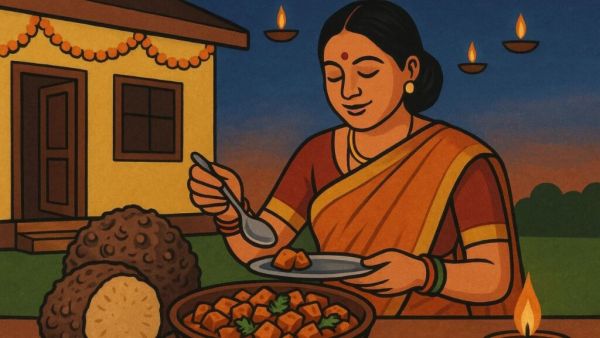
Diwali, India’s most bright and joyous festival, is celebrated with great pomp and show in every home. Food has a special place in the colorful rituals of this festival. Along with sweets, traditional offerings and dishes offered to Goddess Lakshmi, there are some specific rituals associated with local traditions. One of these is the tradition of Jimikand celebrated in eastern Uttar Pradesh and Bihar.
jimikandwhich is also called elephant’s foot potato, suran or ol, holds special importance in the Diwali food. Especially in Kayastha and Brahmin families, it is considered sacred and auspicious. It not only has spiritual importance, but is also extremely beneficial for health, which makes it essential in the Diwali diet.
Tradition of cooking Jimikand
Cooking Jimikand during Diwali is an ancient tradition, which is considered a symbol of bringing good luck, prosperity and happiness. It is traditionally grown, washed, and cooked into curry or bharta. In Varanasi and surrounding areas, families offer it to Goddess Lakshmi and then consume it themselves. In many homes it is also served spicy chokha or mashed. The continued growth of Jimikand from the soil, even after being cut, is a symbol of prosperity and rebirth. This further strengthens the message of development and prosperity of the festival of Diwali.
Importance of Jimikand in Diwali
The spiritual and cultural importance of Jimikand lies in its symbolic features. It is a root vegetable, which continues to grow even after being harvested, and is considered a symbol of continued growth and prosperity. Devotees believe that just as Jimikand never spoils and multiplies, so should wealth and stability remain in the family. By offering it to Goddess Lakshmi, people pray for increase of resources, harmony and prosperity.
Health benefits of Jimikand
Jimikand is not only auspicious but is also full of nutrition. It is rich in antioxidants, which strengthen the immune system and protect cells from damage. Being rich in vitamins, minerals, protein, potassium and soluble fiber, it is considered helpful in digestion, reducing swelling and controlling blood pressure. It is called the ‘King of Tuber Crops’ and is used in traditional medicine in the treatment of various diseases.
Why is Jimikand considered auspicious in Diwali?
Cooking and eating Jimikand during Diwali is associated with messages of prosperity, growth and abundance. It is a symbol of continuous wealth and non-stop blessings. Its longevity, ability to regenerate and tradition of being included in pujas make it a powerful symbol of prosperity. Due to its combination of spiritual symbolism and health benefits, Jimikand is one of the essential rituals of Diwali in Eastern Uttar Pradesh and Bihar, which enhances the festive spirit while maintaining the age-old customs.
How is Jimikand vegetable made?
To make Jimikand vegetable, first peel and chop the Jimikand properly. Then boil it lightly. Heat oil in a pan and add cumin, asafoetida and turmeric. After this add chopped onion, tomato and spices and fry. Add boiled Jimikand to it and cook for some time. Add salt and green coriander as per taste. Some people also add coconut or curd to it. Hot Jimikand curry is served with rotis or rice and is especially eaten on festivals.
-
Has Aneet Padda Replaced New Mom Kiara Advani In Shakti Shalini? LEAKED Post-Credit Scene From Thamma Goes Viral

-
Former India cricketer questions Shubman Gill’s selection after India’s humiliating loss in Perth, his name is…

-
‘Shame on You…’: Navjot Singh Sidhu slams the internet and quashes the rumour of… the reason is…

-
US stocks surge! Dow Jones Jumps 189 points, S&P gains 39, Nasdaq climbs 180 as earnings, inflation take center stage

-
Veteran actor Govardhan Asrani passes away at 84
